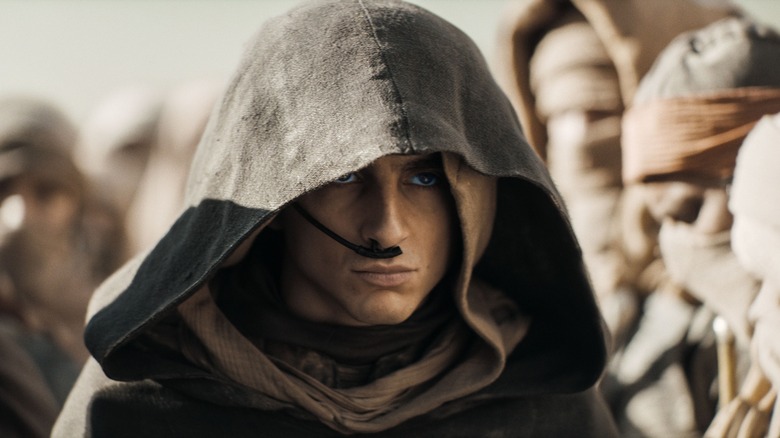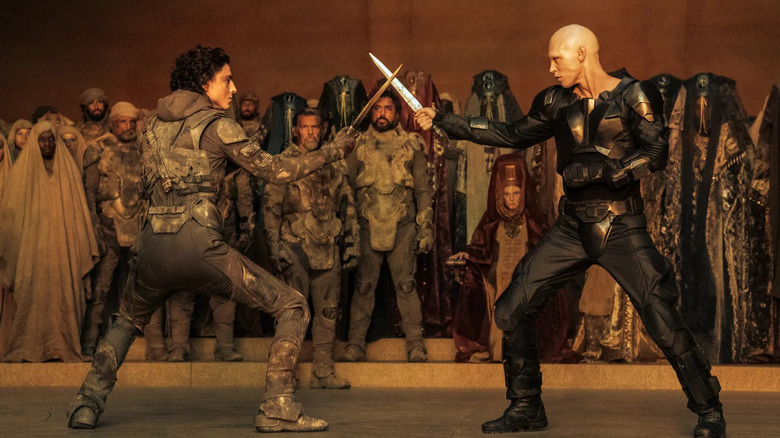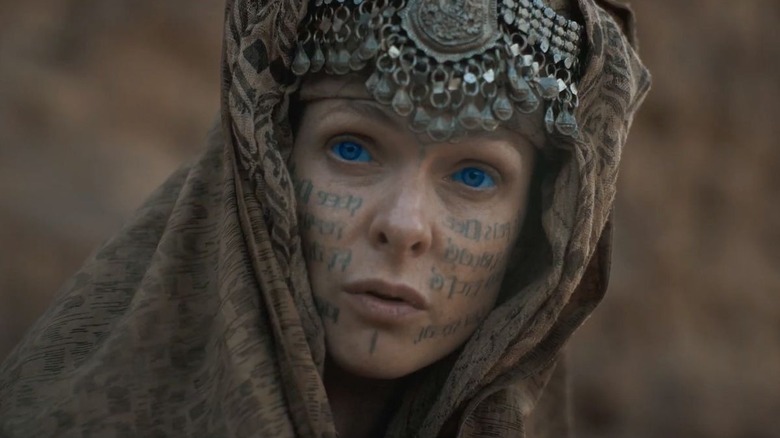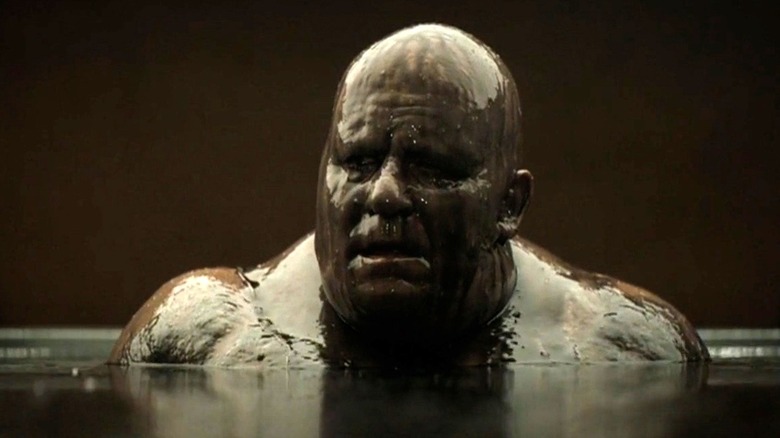Dune: Part Two's Biggest Twist Explained
This post contains spoilers for "Dune: Part Two."
"Dune: Part Two" makes a lot of changes to the source material. It skips over the book's two-year time jump, it lets Chani have a moral backbone, and it removes an entire storyline about Paul having an infant son who tragically dies in a Harkonnen attack. But when it comes to one major, game-changing reveal from the book, the movie stays faithful: Jessica is the Baron Vladimir Harkonnen's secret daughter, and Paul is his secret grandson.
The exact details of how this all came to be are fuzzy; the "Prelude of Dune" novels (not written by Frank Herbert) technically provide an explanation, but many fans don't consider it canon. Based off what Herbert himself actually wrote, Jessica's heritage was a discreet decision made by the Bene Gesserit, a powerful group of witches who have been secretly running a 10,000-year breeding program in order to achieve the right genetics to create the long-prophesized Kwisatz Haderach.
Thematic parallels
For some fans, this twist might seem a little pointless. When Luke found out that Darth Vader was his father, for instance, it was a whole big deal that he spent the entire third movie struggling with. In "Dune: Part Two," however, the information is mostly irrelevant. It doesn't change Paul's hatred against the Harkonnens, nor does it have much impact on how he goes about his revenge plan. The fact that he and Feyd-Rautha are technically cousins is brought up, sure, but it doesn't stop either of the two from trying to kill each other. So, what was the point?
The big advantage is the way it makes us second-guess our initial assumption about how good the Atreides are. Neither the book nor movies ever presented the Atreides as saints exactly, but they did certainly introduce them in a sympathetic position, cornered by enemies who sure seemed far more unlikable. We're told early on that Paul may become an ultra-powerful figure, that he can be capable of causing mass death throughout the universe. We want Paul to resist all this, but the reveal of Paul's Harkonnen bloodline is one of the story's strongest hints that he won't resist the call of the dark side as well as we might've hoped. Both Paul and Jessica are still never as needlessly cruel as the Baron Harkonnen or Feyd-Rautha, but they show traces of that Harkonnen coldness early on.
Regular genes vs. Dune genes
Realistically, this would all be meaningless, as morality itself isn't really a gene that gets passed down from parent to child. But on a symbolic level, it signals a lot about the Atreides' true nature, paving the groundwork for the damage Paul will later inflict upon the universe. If his Holy War is as bad as his visions tell him they'll be, Paul will indirectly kill far more people than the Baron Harkonnen ever did. Paul's coldness as he gains more power might've seemed like it was out of left field, but context like this makes it all feel a bit more earned.
The other problem is that the main characters of "Dune" experience their heritage a little differently than we would, thanks to the Water of Life that both Jessica and Paul have now consumed. The potion allows them to interact with their ancestors, to varying degrees, which means that technically the Baron Harkonnen isn't quite as dead as he seems. His physical body is destroyed, but a tiny shred of his consciousness lives on, and this may cause some pretty big problems later on.
Spoilers for "Dune: Messiah," and "Children of Dune" below.
Abomination
Although Alia is but a mere fetus in the latest movie (and a terrifying hyper-intelligent toddler in the first book), she grows up and becomes a whole big menace in "Messiah" and "Children of Dune." Most of it isn't even Alia's fault; it's because she overdoses on spice and accidentally awakens Vladimir Harkonnen's consciousness inside of her. Not only can she not help but listen to the late Baron Harkonnen's thoughts, but she's essentially possessed by him. Harkonnen wants to use her to reclaim his power from beyond the grave, and stopping him is a lot harder than you'd hope. How do you get rid of something that's literally inside your mind?
The other effect of the Harkonnen reveal is the way it contributes to one of the series' main themes, which is that nothing truly dies, that life works in cycles, that actions have unintended consequences that have shockingly big ripple effects when you span out for generations. The series is filled with deceased characters coming back with a vengeance, even if it's not literally the same person who's returning, and the Harkonnen reveal is our first real taste of this pattern. Paul may have killed the Baron Vladimir Harkonnen, but he'll never fully be able to kill the Harkonnen within.
"Dune: Part Two" is in theaters now.



